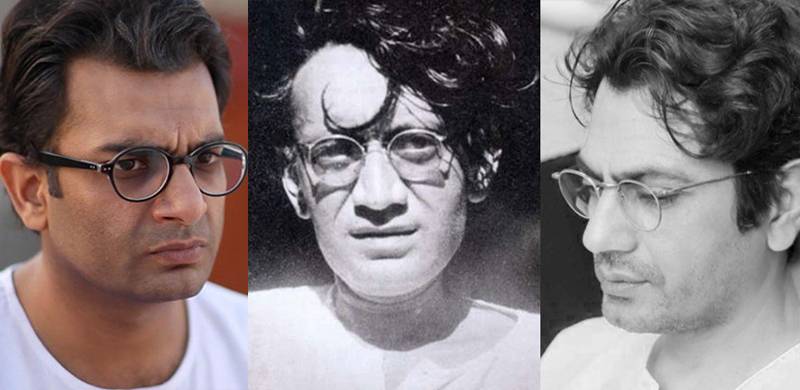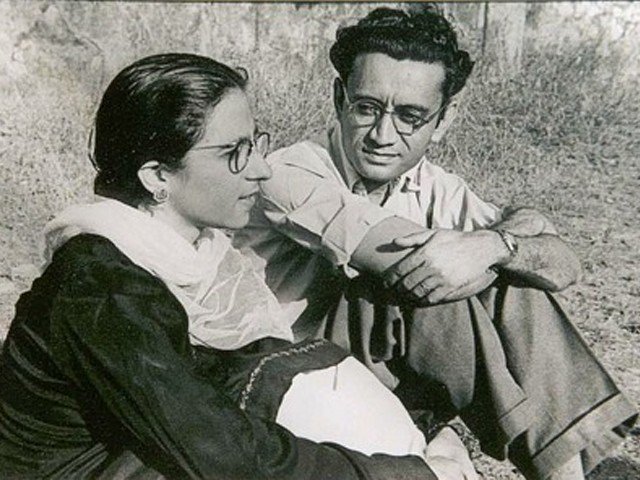
Blessed are the souls that had the privilege of accessing Facebook, Twitter, and other amusing and uncensored sources of information during their early years. Unfortunately, unlike these folks of the favorued lot, I didn’t have the opportunity to indulge into any of the aforementioned activities at a young age. The only amusement we could afford, legally, in those hard times were poetry books and novels. Old musty pages of literature books, available in abundance at the institute’s library, were the only source of comfort that provided some escape from the cruel punishments of Corporals.
During one of my voyages to the bright lanes of our institute's library, I stumbled upon a collection of Saadat Hasan Manto’s Short Stories. To put it more poetically, It was somewhere between the pages of glamor magazines and Dostoevsky's novels that I became bewitched with the works of Manto. The first story of Manto’s that I had the honour and pleasure of reading was his infamous masterpiece called “Thanda Gosht”! His love for reality, coupled with the beautiful composition of Urdu prose was a rather fascinating and fresh experience for an amateur like me. I immediately borrowed a library card from a classmate of mine and got some of Manto’s books issued against it. The experience seemed like a life-changing odyssey until it was all brought to a halt by our House Master, who was also a lecturer of Urdu Literature at the Institution. All of Manto’s books were confiscated and I was asked to report to his office, where I was beaten by him for the transgression of reading Manto.

I believe there are numerous other people, like me, out in the society who were, at some stage of their life, bullied and harassed for admiring Manto. A couple of days ago it was reported that Nandita Das’s recent movie on the life of Manto had been banned in Pakistan. The movie is an ode to Saadat Hasan Manto and is aimed at celebrating his life and works. Formerly, Mr Fawad Chaudary, Pakistan’s Minister for Information and Broadcasting, had expressed his disappointment at the initial ban on the movie and promised to “convince the distributors to take risk of showing a less commercial film to the viewers”. The covert ban was followed by protests all over Pakistan and an online petition, with thousands of signatories, was initiated in an attempt to pressurise the government into lifting the ban. The regressive behaviour of our incumbent government and its ban on Manto has forced the citizenry of Pakistan to self-reflect on the issue of moral hypocrisy found commonly around us.
This ban on Nandita Das’s Manto shows that the moral standards and the underlying hypocrisy haven’t changed much since Manto’s own time. During his short stay at post-partition Lahore, Manto was considered a pariah by everyone around him. Due to his outspoken nature and bold writings, he was repeatedly censored. History bears witness that archaic models of decency and appropriacy have done more harm than good to us as a society. Even after 64 years of Manto’s untimely demise, his works and life aren’t acceptable to the so-called protectors of social morality. The absurd practice of moral policing and censorship to save an already decaying system have proved to be disastrous for our arts and culture. It is time that we self-reflect and join hands to reprimand the malignant, poisonous and pernicious plague of hypocrisy that reigns in our society. This evil cannot be defeated until we unite to fight back against these imposed standards of morality. In Manto’s own words, “If you cannot bear these stories then the society is unbearable. Who am I to remove the clothes of this society, which itself is naked. I don't even try to cover it, because it is not my job, that's the job of dressmakers.”
Long Live Manto, Long live the Truth
During one of my voyages to the bright lanes of our institute's library, I stumbled upon a collection of Saadat Hasan Manto’s Short Stories. To put it more poetically, It was somewhere between the pages of glamor magazines and Dostoevsky's novels that I became bewitched with the works of Manto. The first story of Manto’s that I had the honour and pleasure of reading was his infamous masterpiece called “Thanda Gosht”! His love for reality, coupled with the beautiful composition of Urdu prose was a rather fascinating and fresh experience for an amateur like me. I immediately borrowed a library card from a classmate of mine and got some of Manto’s books issued against it. The experience seemed like a life-changing odyssey until it was all brought to a halt by our House Master, who was also a lecturer of Urdu Literature at the Institution. All of Manto’s books were confiscated and I was asked to report to his office, where I was beaten by him for the transgression of reading Manto.

I believe there are numerous other people, like me, out in the society who were, at some stage of their life, bullied and harassed for admiring Manto. A couple of days ago it was reported that Nandita Das’s recent movie on the life of Manto had been banned in Pakistan. The movie is an ode to Saadat Hasan Manto and is aimed at celebrating his life and works. Formerly, Mr Fawad Chaudary, Pakistan’s Minister for Information and Broadcasting, had expressed his disappointment at the initial ban on the movie and promised to “convince the distributors to take risk of showing a less commercial film to the viewers”. The covert ban was followed by protests all over Pakistan and an online petition, with thousands of signatories, was initiated in an attempt to pressurise the government into lifting the ban. The regressive behaviour of our incumbent government and its ban on Manto has forced the citizenry of Pakistan to self-reflect on the issue of moral hypocrisy found commonly around us.
This ban on Nandita Das’s Manto shows that the moral standards and the underlying hypocrisy haven’t changed much since Manto’s own time. During his short stay at post-partition Lahore, Manto was considered a pariah by everyone around him. Due to his outspoken nature and bold writings, he was repeatedly censored. History bears witness that archaic models of decency and appropriacy have done more harm than good to us as a society. Even after 64 years of Manto’s untimely demise, his works and life aren’t acceptable to the so-called protectors of social morality. The absurd practice of moral policing and censorship to save an already decaying system have proved to be disastrous for our arts and culture. It is time that we self-reflect and join hands to reprimand the malignant, poisonous and pernicious plague of hypocrisy that reigns in our society. This evil cannot be defeated until we unite to fight back against these imposed standards of morality. In Manto’s own words, “If you cannot bear these stories then the society is unbearable. Who am I to remove the clothes of this society, which itself is naked. I don't even try to cover it, because it is not my job, that's the job of dressmakers.”
Long Live Manto, Long live the Truth
